Film translation is just as fascinating to me as game translation, so from time to time we’ll look at how some English-language films have been translated into Japanese, and vice-versa. We previously looked at how The Wizard was translated into Japanese, and it turned out super-interesting.
This time, we’ll be looking at the first Ghostbusters movie, which debuted in 1984. Hopefully this Japanese translation will be just as interesting too!
Important Notes
As we’ve seen in previous articles, big Western movies often get multiple different releases in Japanese. As you might expect, there’s often a theatrical subtitled release and a theatrical dubbed release. But sometimes more versions get made later on. Sometimes television broadcast companies will produce their own subbed and/or dubbed translations too. Sometimes, if the rights to a movie switch ownership, a new translation might get made. And then sometimes there are new translations made for home video releases.
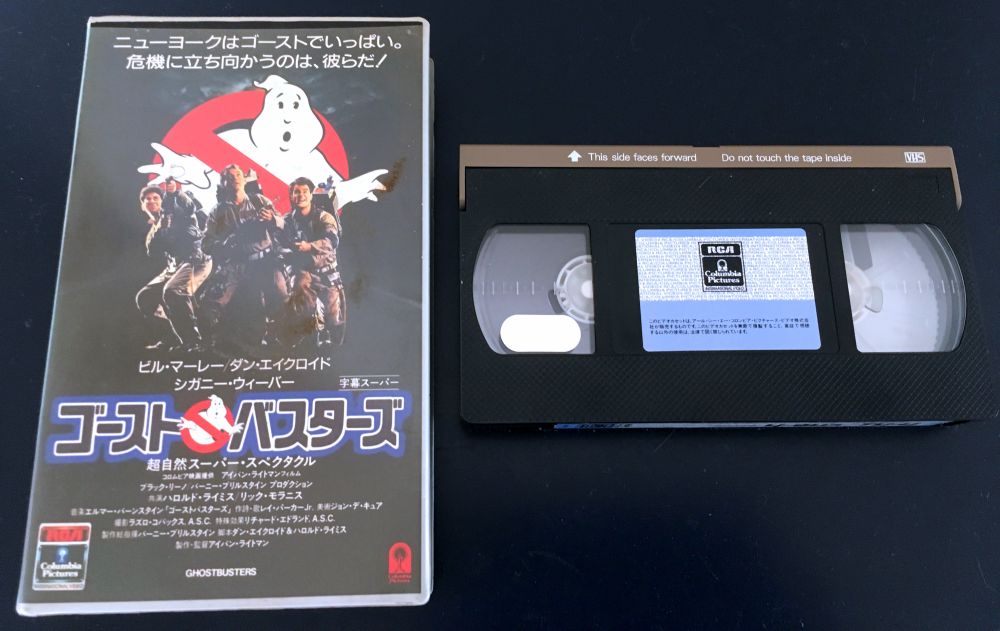
All of this is to say that there are probably several different Japanese translations of Ghostbusters. In this article, we’ll specifically look at the 1989 Japanese-subtitled VHS release of Ghostbusters. I haven’t checked it for myself, but I’ve heard that the subtitled version on Japanese Netflix might use the same translation.
Also, due to time and screen size limitations, movie subtitles in any language are often more like “translated summaries” or “flattened paraphrases” than full-length translations. This is especially true with Japanese movie translations. Because of this, Japanese dubs – which don’t have the same limitations – tend to have more “flavor” than subtitle translations.
Basically, keep in mind that there are probably multiple different translations of Ghostbusters, each with their own pros and cons, and that this is just one of them.
Theme Song
After the movie’s introductory scene, the logo appears and theme song briefly plays. It’s pretty common for Japanese movies not to subtitle songs unless they’re important, but this short bit was indeed translated.
| English Lyrics | Japanese Lyrics (basic translation) | Japanese Lyrics |
| If there’s somethin’ strange in the neighborhood | Whoa, that’s strange | ややや ケッタイナ |
| Who ya gonna call? | What should we do? | どうしよう |
| Ghostbusters! | Get the Ghostbusters | ゴーストバスターズを |
| There’s somethin’ weird and it don’t look good | Whoa, now this is weird | ややや これは不気味 |
| Who ya gonna call? | What should we do? | どうしよう |
| Ghostbusters! | Get the Ghostbusters | ゴーストバスターズを |
Song lyrics rarely translate well between languages, so going from English to Japanese back to English like the above doesn’t work well at all. But we can at least see how the Japanese lyrics follow the basic gist of each English line.
Showing Emphasis
As we saw during the Japanese version of The Wizard, Japanese subtitles sometimes put strange little dots above or below text. This is done for emphasis, much like how we use italics or quotation marks to emphasize words in English.
The above line translates as:
I want to experiment with her for about an hour and a half.
It’s easy for sarcasm and humor to get lost in translation – even more so when subtitles are involved. So we can see how the dots emphasize the word “experiment” to clearly highlight the double meaning intended.
Religious Humor
A scared librarian talks to Peter – one of the main characters – about her experience seeing a ghost. Peter asks the librarian if her family has any history of mental illness.
In English, the librarian says:
My uncle thought he was Saint Jerome.
Because Christianity isn’t a major religion in Japan, this reference would be lost on most viewers. So to keep the point in intact, the translator changed this to:
My uncle acted like a religious sect/cult leader.
In response to this, Peter says in English:
I’d call that a big yes.
The Japanese translator handled this line by saying something like:
That sounds like a “iesu”.
This Japanese word iesu is how the English word “yes” is pronounced… but it’s also the Japanese name for “Jesus”.
In short, even though the original reference to Saint Jerome was lost in translation, the translator was able to compensate for it with an understandable Jesus reference in the following line.
Disgusting Blob
Ray, another of the main characters, spots a hungry green ghost in a hotel hallway. The ghost looks gross and is also sloppily eating hotel food.
In English, Ray comments on the ghost out loud:
Disgusting blob.
In Japanese, he says something like:
What a bad-mannered guy.
It’s not a big difference, but the English word “disgusting” covers more than just bad table manners. I always felt it referred to the ghost’s appearance and its sloppy eating, but I’m sure other viewers might interpret it differently, just as this translator did.
Basically, I just wanted to show how broad, descriptive words can be hard to pin down in translation, and that different people – and translators – can sometimes see the same word differently.
Moving Up
Ray is excited that Peter has made actual, physical contact with a ghost.
In English, Ray excitedly asks:
Can you move?
In Japanese, this became:
Get up!
I always assumed that Ray was asking “can you move?” just because he was curious from a scientist’s perspective. The translator seems to have interpreted “can you move?” in a “can you get out of the way, please?!” sense.
Getting Funky
Peter describes how he feels after being covered in slime.
In English, he wiggles around on the ground and says:
I feel so funky.
In Japanese, he simply says “I smell” or “It smells”.
Nice Shootin’
The disgusting green ghost flees into the hotel ballroom, and Peter, Ray, and Egon follow it inside. Egon gets a little trigger happy and blasts a bunch of stuff with his proton beam.
In English, while Egon keeps blasting away, Peter comments and finishes with a cowboy-themed joke:
OK, alright, alright, hold it, hold it, whoa, whoa! …Nice shootin’ Tex!
In Japanese, this became:
Stop shooting, hold on! …You overdid it.
As we can see, the cowboy joke was lost in translation.
Service Calls
The Ghostbusters become famous after catching some ghosts around New York. Peter promotes the company during a montage scene.
In English, Peter says:
24 hours a day, 7 days a week. No job is too big. No fee is too big.
The joke here is the very last sentence, which comes across as a very Peter-like quip.
In Japanese, this became something like:
24 hours a day, 7 days a week. Complete after-job service included.
Basically, the last half of the English line was condensed down and seemingly mistranslated. Now, instead of giving a funny, pompous-sounding line, Peter kindly reminds everyone that every job they do is backed by a full warranty and that they’ll provide support as needed after a job is done.
Magic Word
Business is booming for the Ghostbusters, and the government takes notice. Walter Peck, a representative of the Environmental Protection Agency, shows up at their office.
At one point, Walter asks Peter to see the storage facility. Here’s how this little scene plays out:
Walter: And may I see this storage facility?
Peter: No.
Walter: And why not, Mr. Venkman?
Peter: Because you did not use the magic word.
Walter: What IS the “magic word”, Mr. Venkman?
Peter: “Please”.
Walter: May I please see the storage facility, Mr. Venkman?
When kids are taught manners in America (and I assume other countries), they’re taught that proper, polite requests should always include the word “please”. For example, instead of saying “give me that book”, you should say “please give me that book” or “give me that book, please”. To emphasize this, “please” is specifically referred to as “the magic word” in English.
The Japanese language doesn’t have this same, singular “magic word” thing, however. So how do you translate this into Japanese?
In the movie screenshots above, we can see how the translator had difficulty finding a perfect solution. In the end, the translator decided to use the word プリーズ (purīzu) – which is just the Japanese pronunciation of the English word “please” – and then stuck it in parentheses in the Japanese subtitles to make things work.
The Japanese subtitles translate to something like this:
Walter: Could you show it to me?
Peter: No.
Walter: And why not?
Peter: You left out a word.
Walter: What sort of word did I leave out?
Peter: “Please”.
Walter: I request (please). I want to see the storage facility.
When culture and language are closely tangled like this, it’s always challenging to translate. It’s also why some fan translators add translation notes to their work – it helps convey things that otherwise get lost in translation. Now that I think about it, I could totally see a fan re-translating this movie and adding a translation note here about how “‘please’ is called the ‘magic word’ in English”.
The Twinkie
Egon explains that he’s worried about the recent rise in ghost energy in New York. He says it suggests something big is coming.
In English, Egon holds up a Hostess Twinkie and says:
Well, let’s say this Twinkie represents the normal amount of psychokinetic energy in the New York area. According to this morning’s sample, it would be a Twinkie 35 feet long, weight approximately 600 pounds.
In Japanese, this was translated as:
Let’s say this snack pie is the normal amount of psychic energy in New York. According to this morning’s readings, a snack pie 10 meters long, weighing 272 kilograms is coming.
There are two major things that stick out here.
First, the Twinkie reference was replaced with the phrase “snack pie”. This is because Twinkies aren’t a common thing in Japan, so the name would’ve meant nothing to viewers. In fact, we saw this same problem when we looked at the Japanese translation of The Wizard, which called them “cakes”.
Second, we can see that translator chose to convert the length and weight units into the metric system. This is an understandable choice – feet and pounds would’ve meant little to the normal Japanese viewer, after all.
Anyway, both of these things are examples of bringing the source to the audience (converting stuff to be understood), rather than taking the audience to the source (keeping stuff unchanged and asking the audience to figure it out). In other words, this scene provides two prime examples of the very definition of localization.
This scene is also a good example of how culture, food, and language are intertwined, and how even simple lines in one language can require changes in another.
Big Ones
Winston, the newest member of the Ghostbusters, responds to Egon’s Twinkie statement. Peter then walks into the room and asks what they’re talking about.
In English, the conversation goes:
Winston: That’s a big Twinkie.
(Ray says stuff, Peter walks in and asks how things are going. Egon says it’s not going good.)
Winston: Tell him about the Twinkie.
Peter: What about the Twinkie?
It’s hard to explain how this funny little exchange was translated into Japanese, but here goes.
First, Winston responds to Egon’s “snack pie” comment by saying dekapai da, which can mean “that’s a huge pie”. A few lines later, Winston tells Egon:
Tell him about the “dekapai”.
The thing is, dekapai can mean “huge pie”, but it also has a separate interpretation that combines dekai (“huge”) and oppai (“breasts”). So it’s understandable that Peter would confusedly say “dekapai?” immediately afterward.
Basically, in the English script, this scene ends with Peter making a funny misunderstanding of what the others were just talking about. Retaining this in translation couldn’t have been easy, given that the whole basis of the joke – the Twinkie reference – was already lost in translation to begin with. But, by using wordplay to connect the snack reference with a different Japanese joke, the translator was able to ensure the scene ended with a similarly comedic misunderstanding.
There are probably countless ways this scene could’ve been translated to achieve a similar effect, so if there are other translations of the movie, I’d be curious to see how they handled it.
Masters and Keepers
By this point in the movie, two humans have been possessed by evil beings. They have new names and new titles.
In English, Dana Barrett becomes Zuul, the Gatekeeper. In Japanese, her title is translated as “the Gate-Protecting God”.
Another character, Louis Tully, becomes Vinz Clortho, the Keymaster. In Japanese, his title is translated as “the Key God”.
Also, the movie’s main villain is Gozer, the Destructor. In Japanese, this title is translated as “the God of Destruction”.
Only Zuul
Peter meets Dana for a date, but realizes that she’s been possessed by an evil being called Zuul.
In English, Peter and Dana/Zuul have this famous exchange:
Peter: I want to talk to Dana. Dana, it’s Peter.
Dana/Zuul: There is no Dana. There is only Zuul.
Peter: Oh, Zuuly, you nut. Now, come on. […] Can I talk to Dana?
Dana/Zuul (in evil, deep voice): THERE IS NO DANA, ONLY ZUUL.
In Japanese, this was translated as:
Peter: I want to talk with Dana. Understand? Dana. It’s me.
Dana/Zuul: Dana is not here. I am Zuul.
Peter: Oh, come on, Zuul-chan. […] Bring out Dana.
Dana/Zuul: DANA IS NOT HERE. I AM ZUUL.
In Japanese, Dana/Zuul’s first line uses some feminine speech patterns. But in her next line with the evil voice, it’s all dropped.
Also, we can see how “Zuuly” was translated as “Zuul-chan”, which is a nice example of how Japanese the honorific “-chan” works in general.
Meeting Vinz
Louis Tully, who has been possessed by an evil entity, runs around New York acting like a crazy person.
In English, Louis/Vinz runs up to a horse and introduces himself:
I am Vinz. Vinz Clortho, Keymaster of Gozer, Volguus Zildrohoar, Lord of the Sebouillia.
In English, this line is intentionally fast-paced and filled with crazy talk that isn’t meant to be fully understood. But, as we’ve already seen, Japanese subtitles are all about the opposite of that: heavy simplification for the sake of understandability.
The result of these two competing ideas is a simpler, straightforward translation that strips out details:
I am Vinz, the protector of Gozer’s key.
This highlights one of the aspects of subtitle translations that translators have to juggle with: what’s the maximum amount of info you can reasonably share within the limited screen space/screen time available?
Key Info
Louis/Vinz gets picked up by the police and dropped off at the Ghostbusters’ headquarters. Egon conducts some tests on him and asks him some questions.
Louis/Vinz explains to Egon about Gozer. The explanation is pretty complicated, so let’s do a side-by-side translation comparison this time:
| English Line | Japanese (basic translation) |
| Gozer the Traveller, he will come in one of the pre-chosen forms. | Gozer will appear in a certain form. |
| During the rectification of the Vuldronaii, the Traveller came as a large and moving Torb! | When he wiped out the Voldians, he was a giant slug. |
| Then, during the third reconciliation of the last of the Meketrex Supplicants they chose a new form for him… that of a Giant Sloar! | For the third subjugation of the Maketorenians, he was a fire-breathing toad. |
| Many Shubs and Zulls knew what it was to be roasted in the depths of the Sloar that day I can tell you. | The Maketorenians were roasted in its flames and defeated. |
Most of the English line above is said very quickly, and the sheer weirdness of it makes it hard to fully understand. So it’s no wonder that the Japanese translator had a difficult time with it.
In the Japanese translation, we can see how things were simplified, which is normal enough. My translator instincts also suggest that the translator accidentally swapped the made-up words “Torb” and “Sloar” and misheard them as “toad” and “slug”.
This brings up another point in film translation: you don’t always get the scripts. In those cases, you have to rely entirely on the audio track. This doesn’t sound bad at first, but just think of how often people mishear song lyrics. And then there’s this phenomenon:
Basically, audio communication can lead to all kinds of misunderstandings and incorrect information. As such, translations that are based on audio alone are open to further mistakes. And if you’re dealing with older media with lower quality audio, translation mistakes are probably inevitable at some point. I believe that’s what happened in the Japanese translation of this scene and in a few others in Ghostbusters.
One last thing thing of note is the last sentence in the Japanese line. There’s wordplay involving maketore jin – which I’ve rendered as “Maketorenians” above – and the word maketa (“defeated”). This sort of wordplay isn’t in the original English line, but it was likely added to mimic the smug delivery of the original line.
Getting Testy
The EPA guy shuts down the Ghostbusters’ containment unit, which unleashes a huge amount of ghosts all over New York. The Ghostbusters are arrested and then talk to the mayor about what’s going on.
Walter Peck, the EPA guy, tries to explain to the mayor that the Ghostbusters are scam artists.
Walter: And they call these bozos who conveniently show up to deal with the problem with a fake, electronic light show.
Ray: Everything was fine with our system until the power grid was shut off by “dickless” here.
Walter: They caused an explosion.
Mayor: Is this true?
Peter: Yes, it’s true. This man has no dick.
This joke was retained in the Japanese version, except “dickless” was translated as tamanashi, which means “no balls” or “ball-less”.
Later on in this scene, Peter takes another stab at Walter Peck.
In English this short exchange goes:
Peter: Well, you can believe Mr. Pecker.
Walter: My name is Peck.
“Pecker” is a slang term for “penis” in American English, but the insult wouldn’t make any sense in Japanese if translated as-is. To get around this, the translator instead referred back to the previous insulting nickname and added a kun suffix. So he now calls Walter tamanashi-kun, which is roughly something like “Mr. No Balls”.
Scared to Death
Winston, who’s sort of the most normal and relatable member of the Ghostbusters team, explains his experience with ghosts.
In English, he tells the mayor:
Look, I’ve only been with the company for a couple of weeks. But I gotta tell ya, these things are real. Since I joined these men, I have seen shit that will turn you WHITE.
In Japanese, this became:
This is only my second week since I joined the company, but ghosts are real. I’ve almost pissed my pants a bunch of times.
As we can see, the Japanese version replaces the original joke with bathroom humor. I’m guessing that maybe the use of the word “shit” in the English line inspired it.
Dogs and Cats
The Ghostbusters explain how bad things will get if they don’t stop Gozer. They explain it by saying there would be disasters of Biblical proportions. Real “wrath of God” stuff, like fire and brimstone coming from the sky.
In English: Peter ends the examples of Biblical disasters by saying:
Dogs and cats, living together! Mass hysteria!
When I was a kid, I just thought the idea of cats and dogs literally living together was funny – after all, they’re usually considered mortal enemies. At the time, though, I also had this feeling that maybe there was more to the joke that I wasn’t getting, like there was something smarter people or grownups were meant to get from it.
Later in life, after learning the Biblical meanings of “knowing someone” and “living together with someone”, I was like ah, that must be it. Of course, that might be reading too much into things – maybe it is just about these rival animals co-habitating.
Whatever the case may be, it’s clear that the Japanese translator interpreted the line the second way and translated “living together” in the Biblical sense:
Dogs and cats mating! The world in mass chaos!
Threatening Words
The mayor agrees to let the Ghostbusters do their thing. He also orders his staff to kick Walter Peck out of the room.
In English, as Walter is being escorted away, he yells at Peter:
I’ll fix you, Venkman. I’m gonna fix you.
This is a different way of saying “I’ll get you for this!” or “You’re gonna pay for this!” in English.
In Japanese, this line is:
Remember this!
Basically, “I’ll get you for this!” is a sort of stock phrase for swearing revenge in English, while “remember this!” is the Japanese stock phrase for the same thing. I often see translators-in-training who haven’t made this connection yet, so I thought this would be a good example to show of both things in action.
Fruit Basket
As Walter Peck is getting thrown out of the room, Peter makes some smug, sarcastic comments.
In English, Peter says:
I’m gonna get you a nice fruit basket. I’m gonna miss him!
In Japanese, this was translated as:
This guy is an “okama”.
You could probably write an entire book about the Japanese word okama, but basically it’s a Japanese term for a homosexual man.
I’m not sure why the translator went with this choice, though. My best guess is that the English line was misinterpreted as “this guy is a fruit”, with “fruit” being an English slang word for a homosexual man. Or maybe the translator is continuing to play off of Peter’s previous insults. I don’t know.
After I first posted this article, a colleague watched the Japanese subtitled version of Ghostbusters that’s available on Japanese Amazon Prime. The subtitles are all the same as what’s shown in this article’s screenshots, except for this specific okama line.
The word okama was replaced with kawarimono, so the Japanese line now means “he’s a weirdo”.
Climbing Stairs
The Ghostbusters arrive at the skyscraper that’s at the center of all the ghost energy. But it’s been wrecked, so they have to climb up lots and lots of stairs to reach their destination.
In English, the exhausted Ghostbusters share this little exchange:
Peter: Where are we?
Ray: It looks like we’re in the teens… somewhere.
Peter: Well, when we get to 20, tell me. I’m gonna throw up.
I never saw any extra meaning to this dialogue besides being so tired that he’s ready to throw up, but the Japanese translator took it a different direction:
Peter: What floor are we on?
Ray: Still in the low teens.
Peter: Tell me when we turn 20.
As we can see in the screenshot above, the “20” part is emphasized in the Japanese subtitles with those little dots again. This is pointing out the age joke.
In Japan, citizens become adults and are legally allowed to drink once they turn 20. So when I first saw this Japanese version of Ghostbusters, I thought this age joke was going to end with a reference to vomiting as soon as they the legal drinking age. But the whole throwing up thing is missing from the translation entirely – there’s no line after the part after turning 20. Maybe I’m just missing something.
Not Just a Dog
Dana and Louis, who are still possessed by Zuul and Vinz, turn into terrifying, demonic-looking dog creatures. Peter has been dating Dana, so he’s naturally shocked when he sees her transform.
In English, Peter says:
Okay. So… She’s a dog.
Normally, calling someone a girl a dog in English is a way of saying that she’s really ugly. But the joke in this case is that she’s literally a dog.
In Japanese, ugly girls are called pigs, not dogs. Unfortunately, the monsters in question are clearly dog-like, so how do you make this joke work in translation?
I’m sure the translator struggled to find a good solution. In the end, the Japanese line simply combines references to both animals:
My girlfriend… is a dog-pig.
I was curious about this “dog-pig” phrase, so I looked it up online and it’s not really talked about much on Japanese sites. But I did find this comment on a Japanese message board thread about whether or not it’s rude to laugh in a movie theater:
This was when Ghostbusters was playing in theaters. In the scene where Bill Murray says “My girlfriend… is a dog-pig.” a group of foreigners in the middle seats laughed like crazy. Something must’ve been lost in translation due to foreign slang or something, because not a single Japanese person made a sound after that line. It must’ve been funny, because the foreigners seemed to really like the joke.
Gods or Not
Ray asks the almighty Gozer to leave this dimension. Gozer asks if he’s a god, to which he answers “no”. Gozer blasts them all with energy beams and nearly kills them.
After nearly dying, Winston says this famous line in English:
Ray. When someone asks you if you’re a god, you say YES!
In Japanese, this line is translated as:
If someone asks you if you’re a god, say “iesu”!
As we saw previously, the word iesu is the Japanese pronunciation of the English word “yes” and is also the Japanese name for “Jesus”. So this line adds an extra layer of humor on top of an already funny line. The pun first appeared at the start of the movie, and it appears again here at the end of the movie, so you could even consider it a nice little callback/comedy bow that’s been neatly tied.
But should a translator, when not compensating for stuff that’s lost in translation, add things not found in the original source? That’s one of the great debates that’s been going on for ages. In this case, at the very least, I bet this line’s translation had Japanese viewers laughing.
Making Food
After Gozer nearly kills the Ghostbusters, Peter is understandably angry and ready to destroy Gozer.
In English, Peter says:
All right. This chick is TOAST!
Calling someone “toast” in American English is a way of saying that someone is about to receive a thorough defeat – Peter isn’t literally going to make burned bread out of Gozer. At the same time, though, the word “toast” in this situation does also suggest they’re going to roast her with their weapons.
In Japanese, Peter says something like:
Just you watch. We’re gonna turn you into yakitori!
Yakitori is a type of Japanese skewered chicken, usually charcoal-grilled and seasoned with a special sauce:
From this, we can see that the Japanese translation tries to cover both the literal food aspect of Peter’s line and the implied meaning of roasting Gozer with their weapons.
Going Downtown
The Ghostbusters have powered up their weapons and are ready to fight Gozer.
Just as the team is about to blast Gozer, Peter says in English:
Let’s show this prehistoric bitch how we do things downtown.
It’s hard to translate this phrase back into English, but in Japanese, Peter says something like:
This is the only way to deal with ugly bitches.
Made-up-on-the-spot English quips like this usually don’t transfer well into Japanese, and converting the translation back into English doesn’t work well, either. But this Japanese translation does manage to give off a pretty strong, snappy vibe that makes it stand out. So it’s clear that the translator gave this line some serious thought.
Nimble Little Thing
Gozer easily dodges the Ghostbusters’ attack, does an acrobatic leap through the air, and lands behind them.
In English, Peter remarks:
Nimble little minx, isn’t she?
In Japanese, this became:
That’s a Super Ultra C technique.
The Japanese phrase “Ultra C” first took hold during the 1964 Olympics, which were held in Tokyo. The Japanese men’s gymnastics team had its own classification system for different techniques, ranging from A to C, with C being the most difficult. Things beyond C were called “Ultra C”, and then “Super Ultra C” was then used to refer techniques even beyond that.
I’ve read that difficulty system has been changed to go from A to G these days, but the “Ultra C” and “Super Ultra C” terms still remain part of the Japanese language.
Aim High
The Ghostbusters prepare to blast Gozer with their beams again.
In English, Ray refers to Gozer’s hairstyle when he shouts:
Aim for the flattop!
In Japanese, this became:
Aim for the punk hair!
I’m mostly just mentioning it because I like this screenshot.
Reference Away
Gozer disappears into thin air. Gozer’s voice then asks the Ghostbusters to choose a form of the Destructor. The Ghostbusters are confused at first, but then Peter suddenly understands.
In English, Peter explains by saying:
Whatever we think of, if we think of J. Edgar Hoover, J. Edgar Hoover will appear and destroy us.
In Japanese, this became:
Whatever comes to our minds, it’ll become the destroyer.
J. Edgar Hoover was the first director of the American FBI, but Japanese audiences wouldn’t have understood the reference. So the translator understandably dropped the reference. There probably wasn’t enough screen space and time to replace it with a different reference, but I wonder what sort of replacements the translator considered, if any.
Taxi Cab
Despite the appearance of a giant marshmallow monster, the Ghostbusters successfully defeat Gozer. A big explosion sends everyone flying, along with copious amounts of marshmallow debris.
The Ghostbusters regroup. Some are absolutely covered in marshmallow goop. Egon comments in English by saying, “I feel like the floor of a taxicab.”.
The joke is that New York taxis are notorious for being filthy. But Japanese audiences wouldn’t necessarily be aware of this, so the translator changed the line into something more understandable: “I’m human cotton candy” or “I’m a cotton candy man”.
It’s Over
The movie comes to a close as Winston triumphantly shouts from the top of the building.
In English, Winston shouts, “I love this town!”.
In Japanese, this became “New York, banzai!”, which is something like “Long live New York!” or “Hurrah for New York!”.
Final Thoughts
We’ve only looked at a handful of lines from the Japanese Ghostbusters translation, but they’re certainly not the only interesting, noteworthy ones in the movie. Still, these few highlights alone have been pretty enlightening, so if you’re studying Japanese or studying translation, definitely give the Japanese version of Ghostbusters a watch sometime.
Unfortunately, the translator wasn’t credited in this Japanese VHS release, so if anyone has any information, let me know. And if there are any specific lines I skipped that you’re curious about, let me know in the comments and I’ll take a look.
This has been a fun little look at Ghostbusters from a different angle than usual. Hopefully you enjoyed it too!


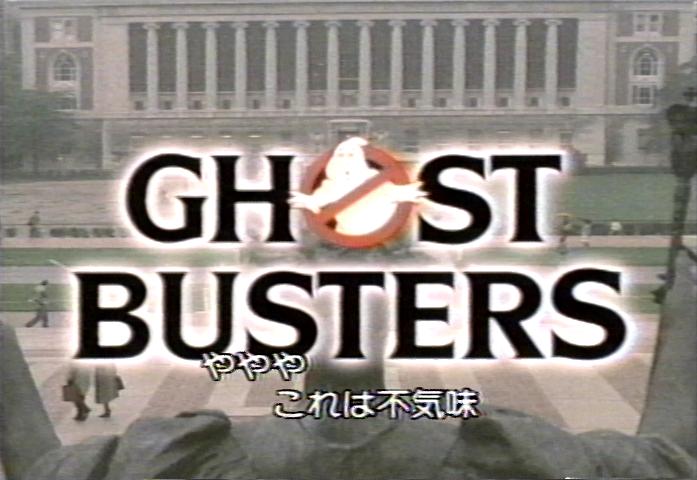
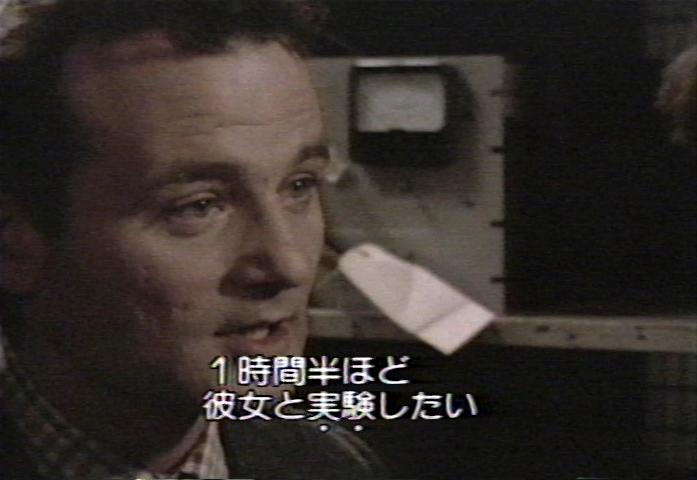
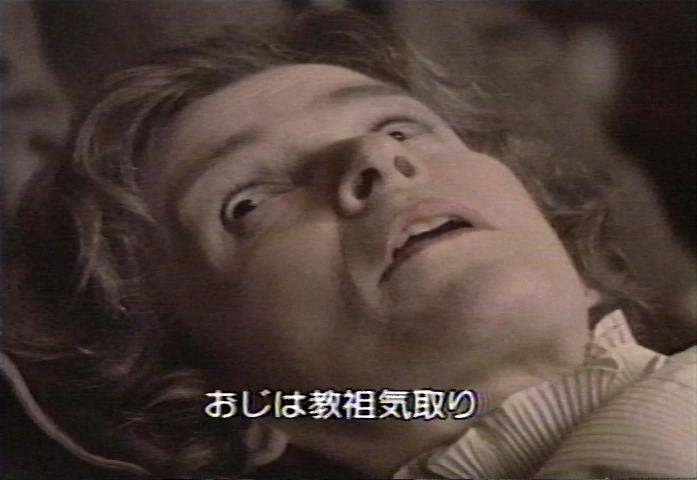
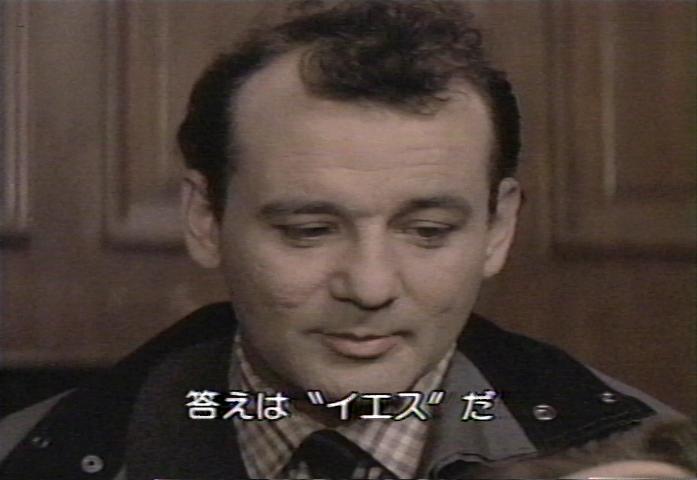

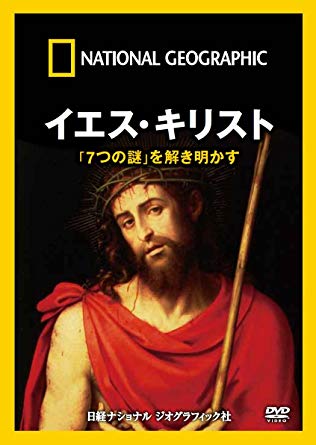
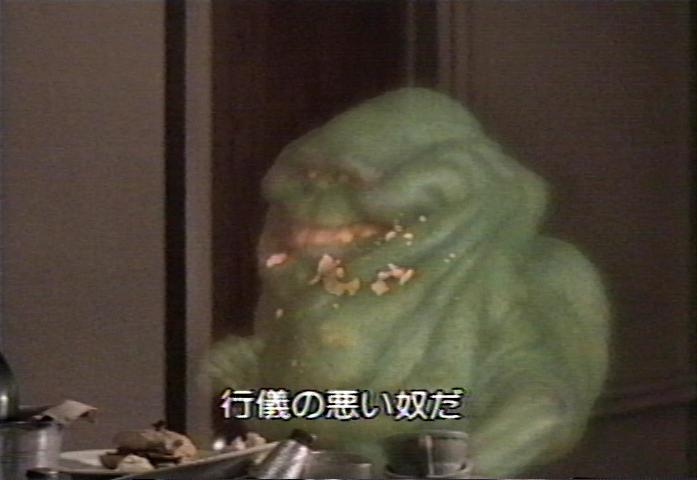

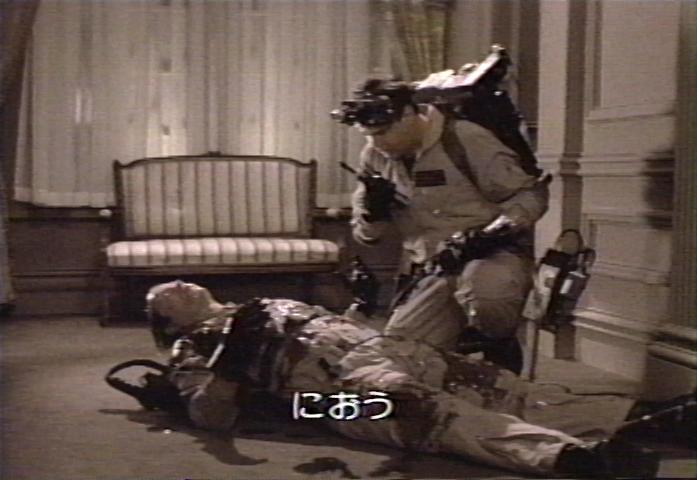

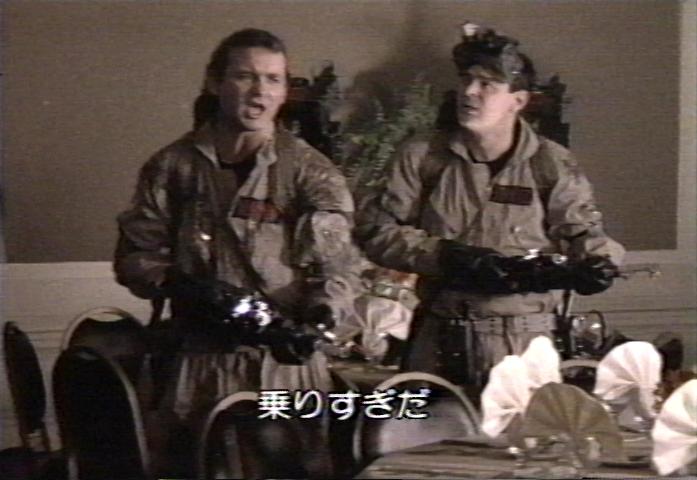




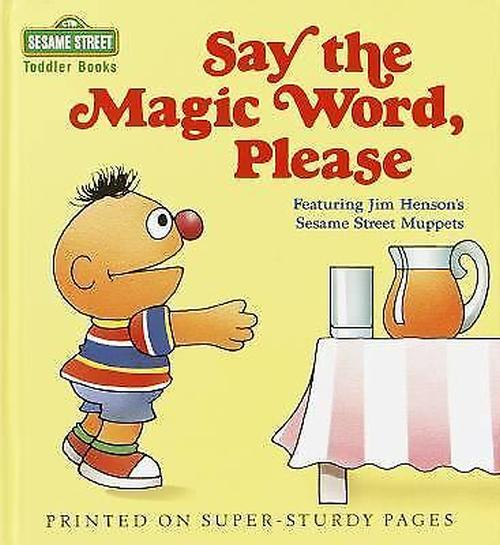
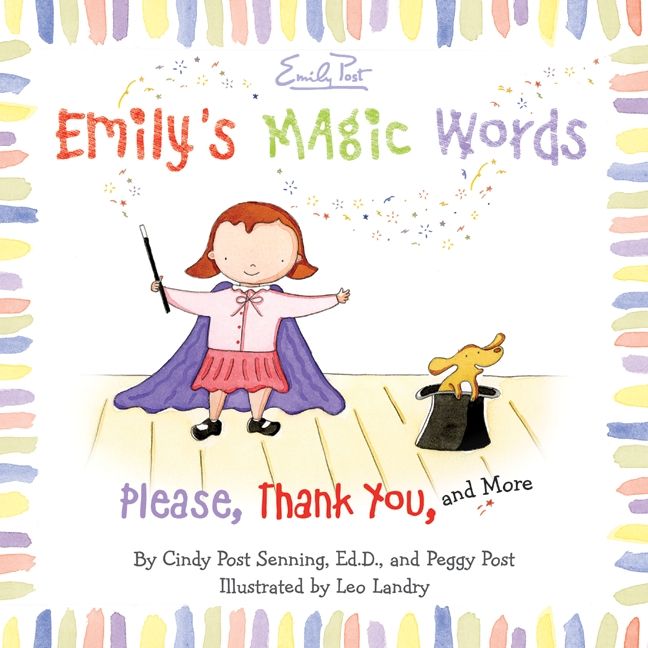

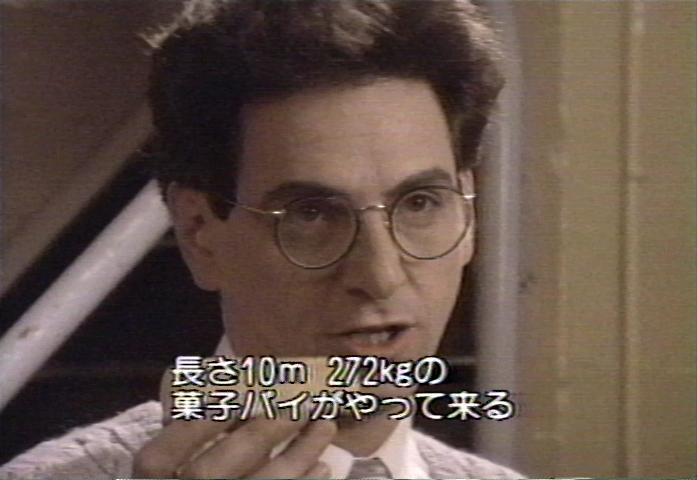
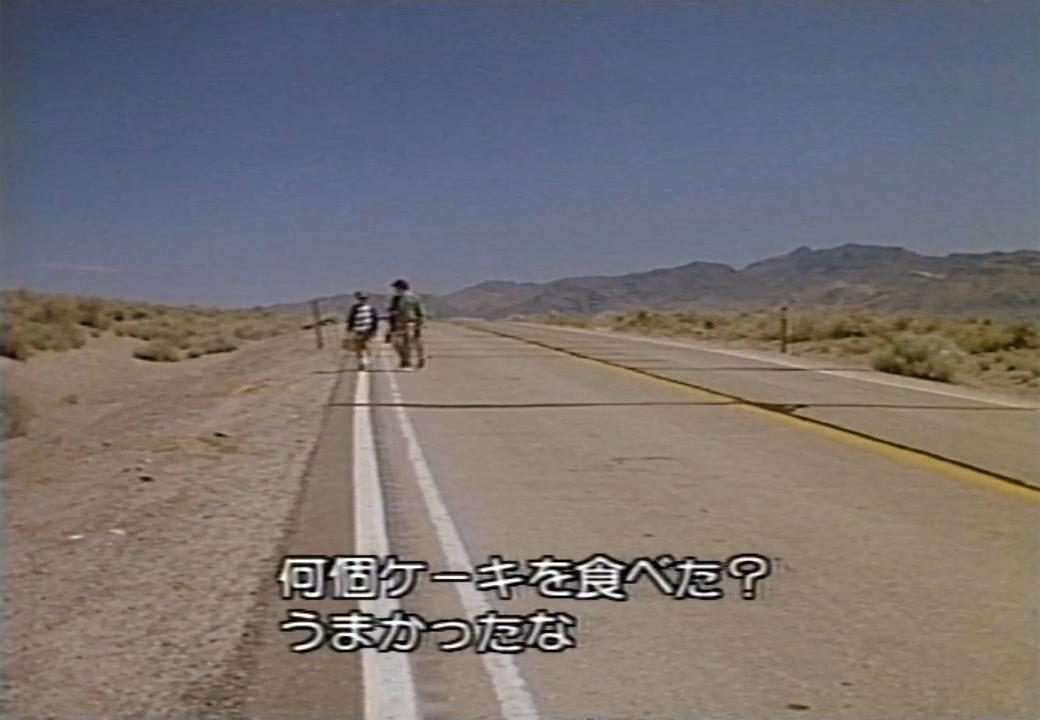
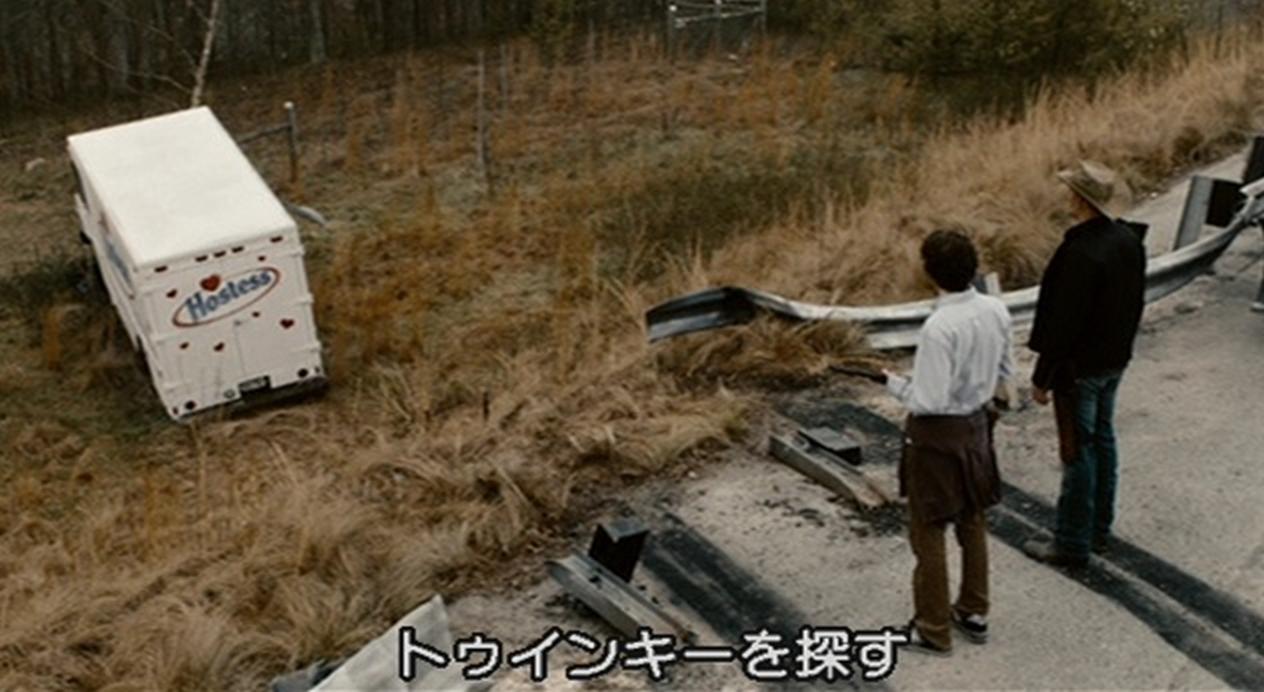
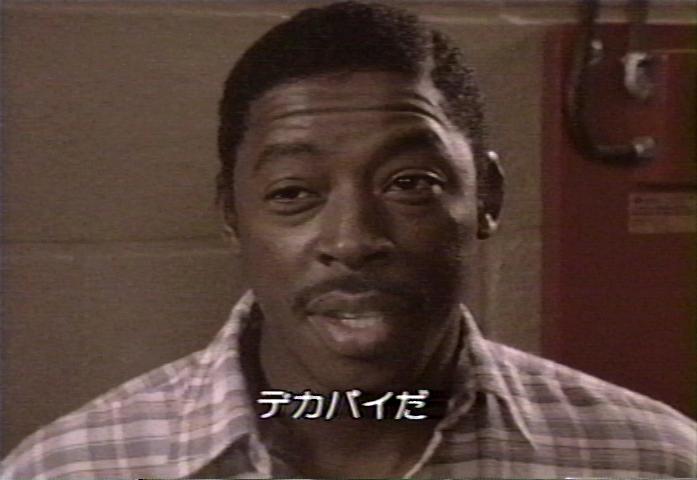
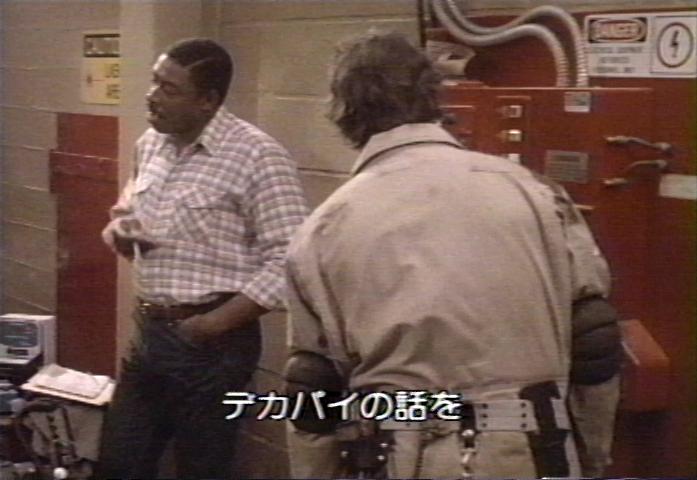
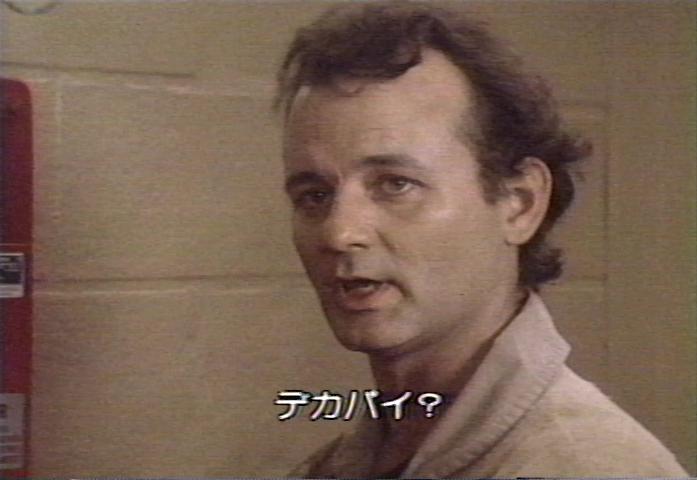
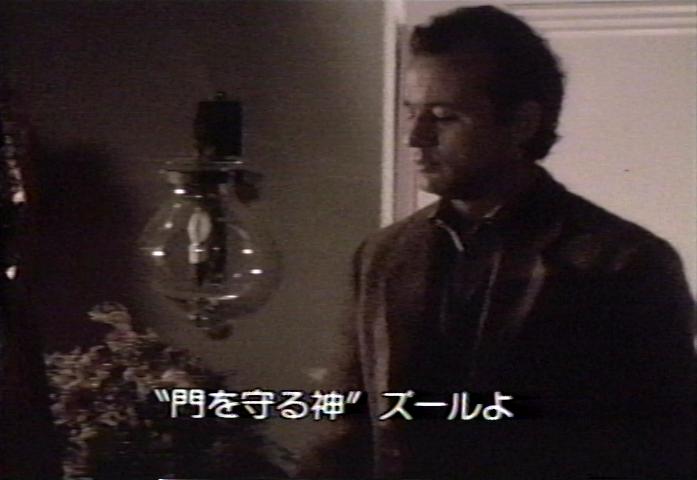
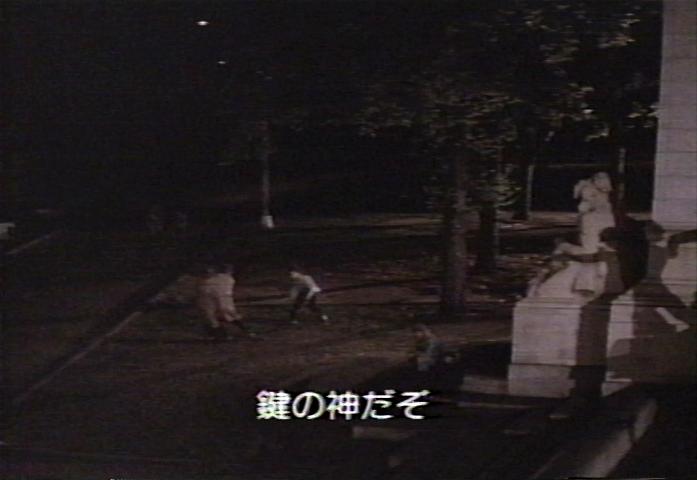


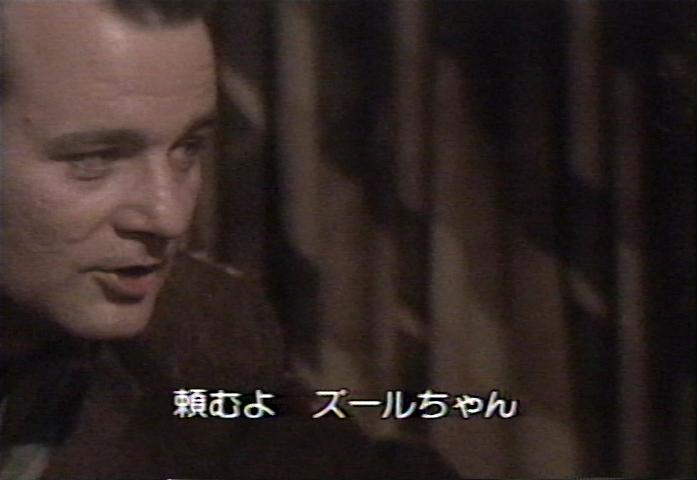
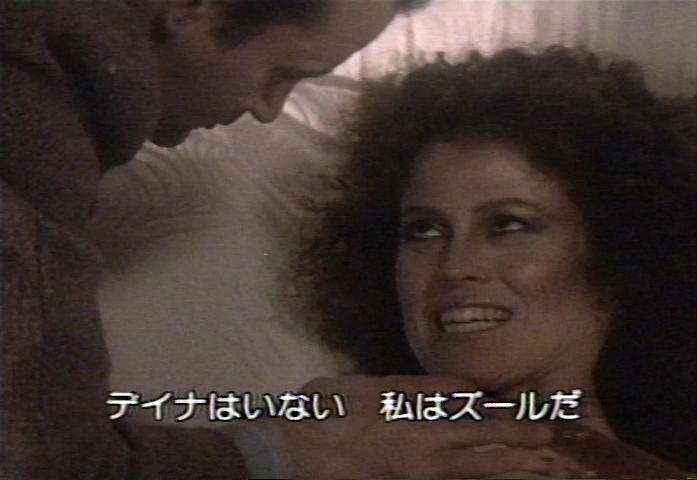
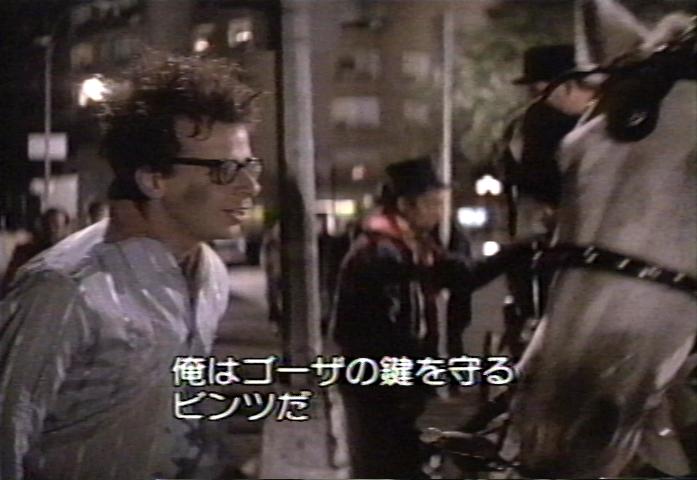
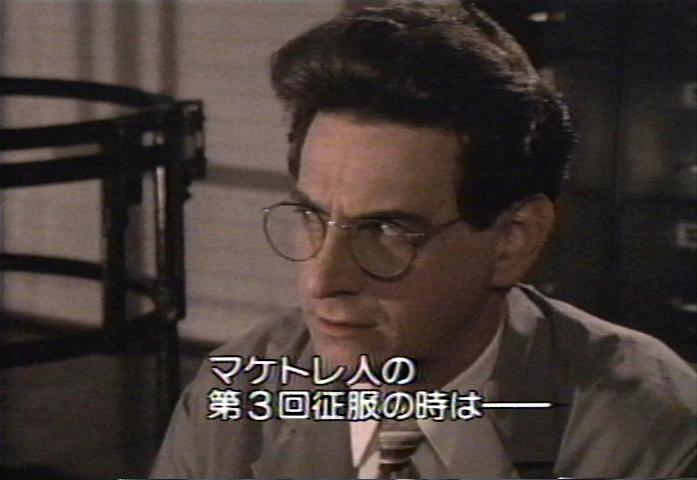


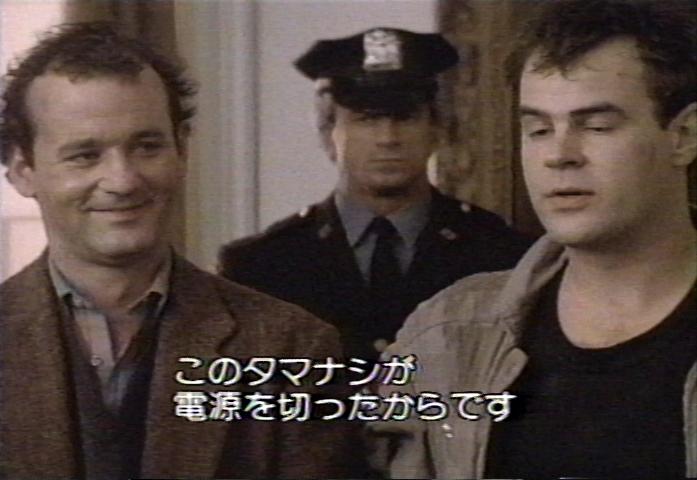
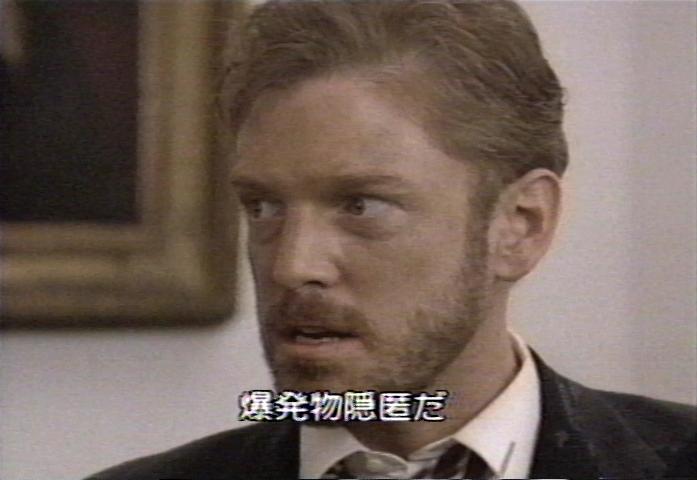
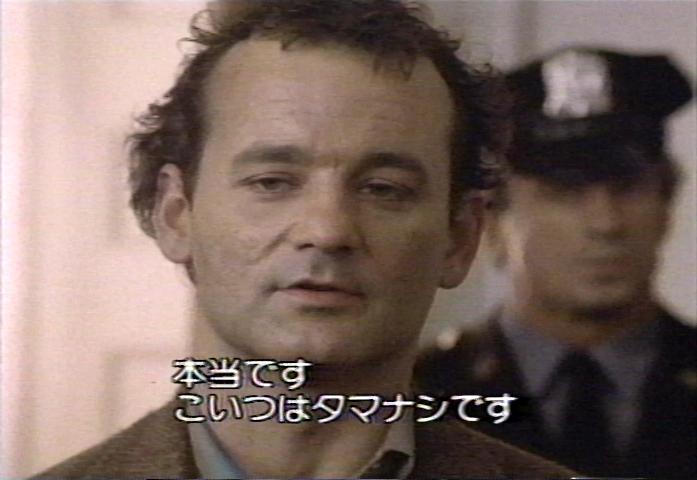
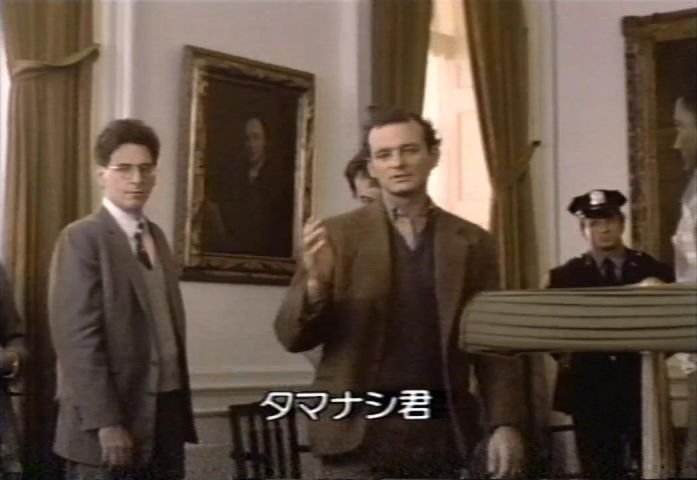
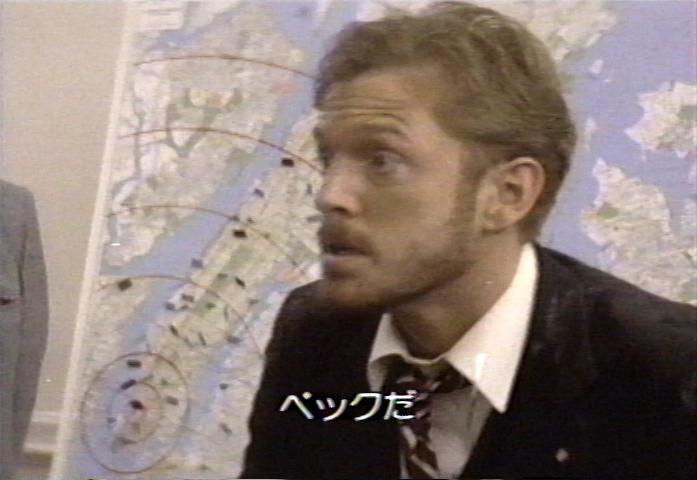
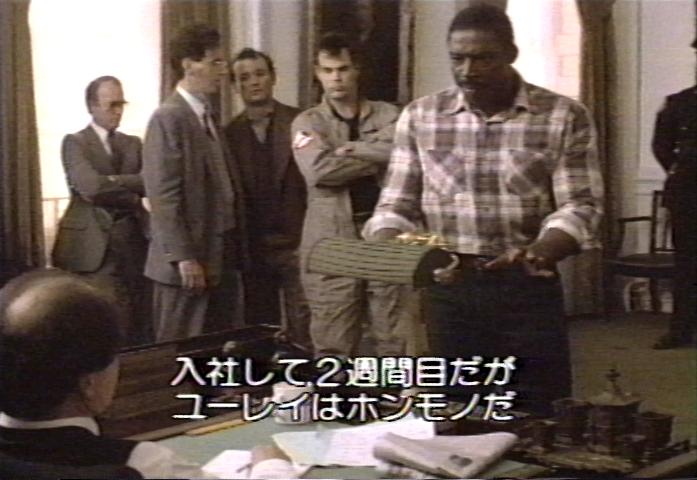
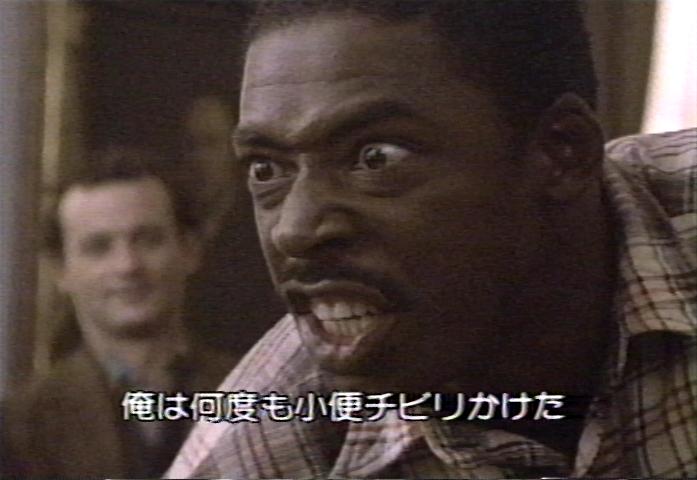
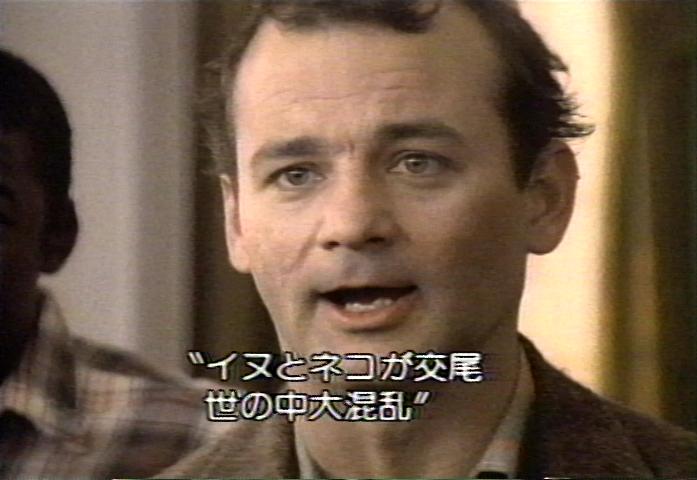
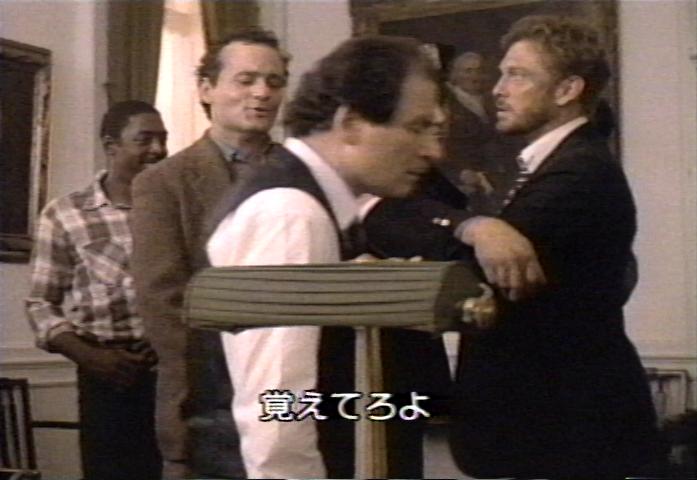
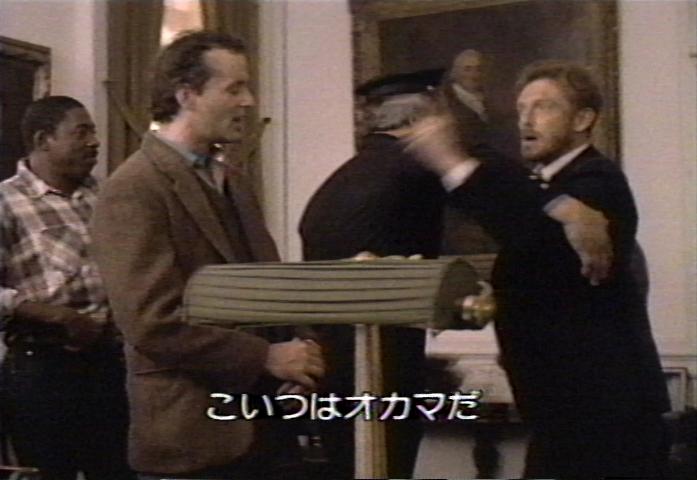
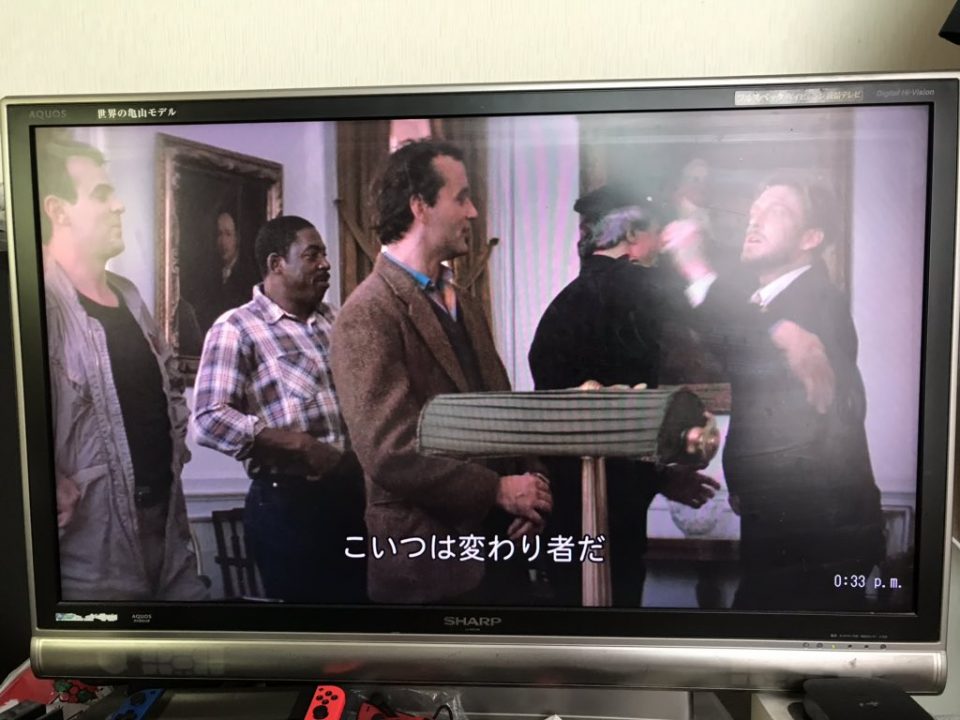
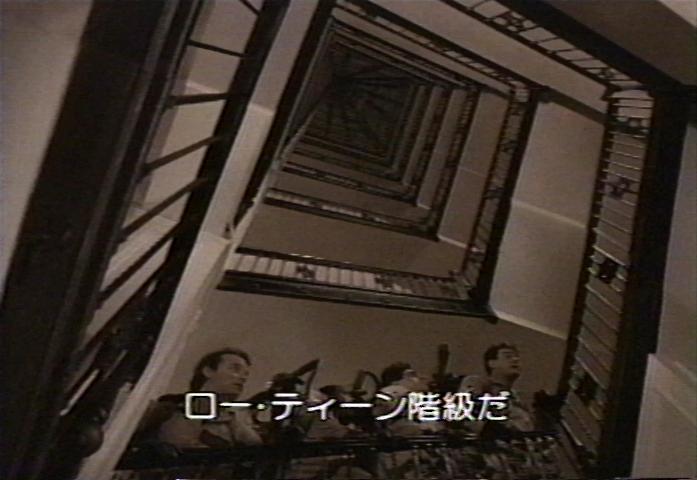
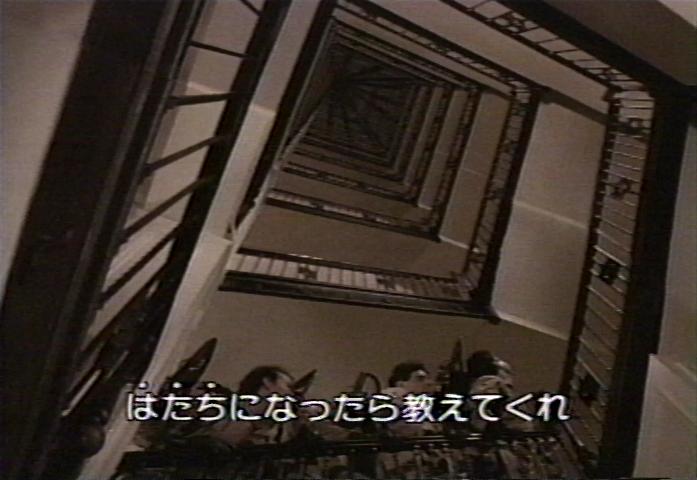
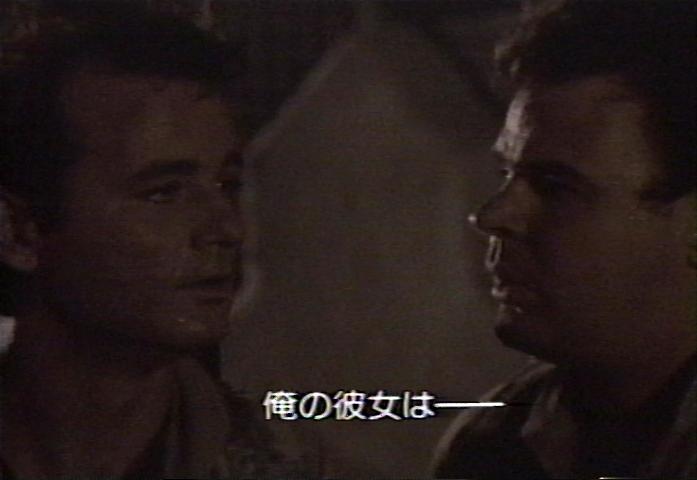
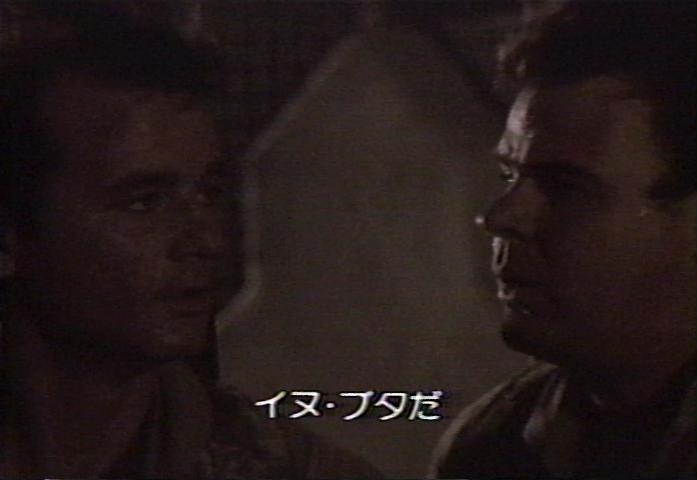
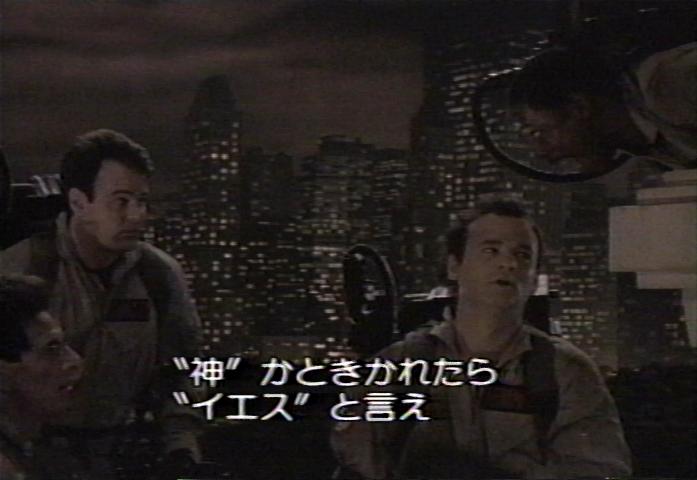
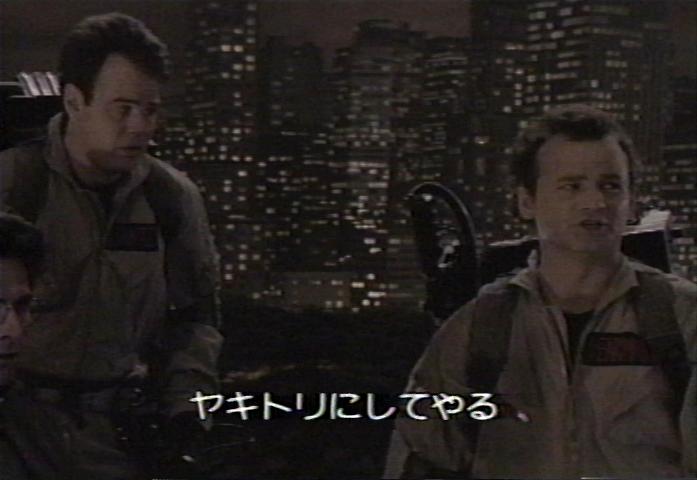


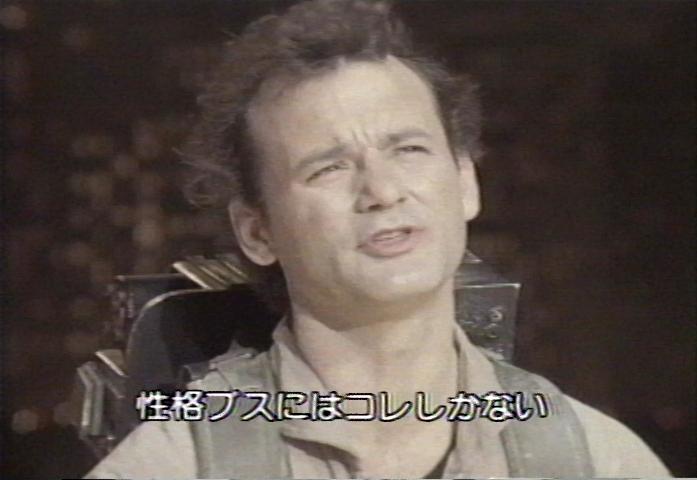

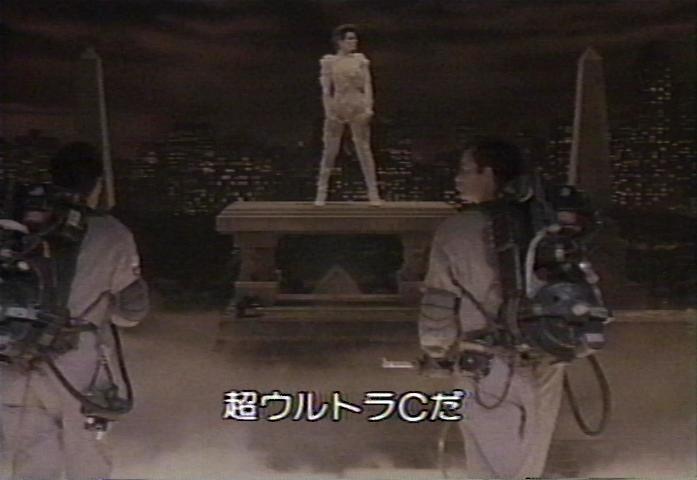

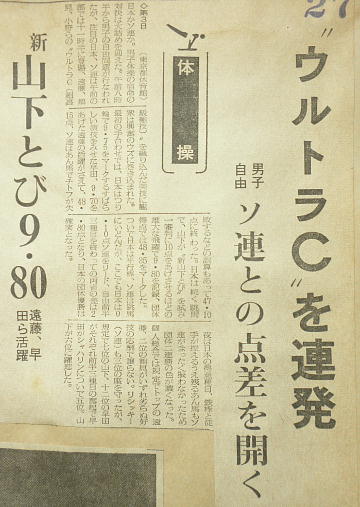


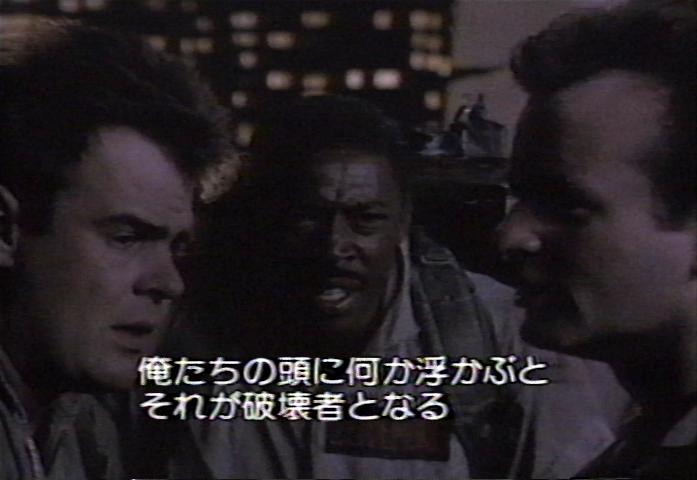
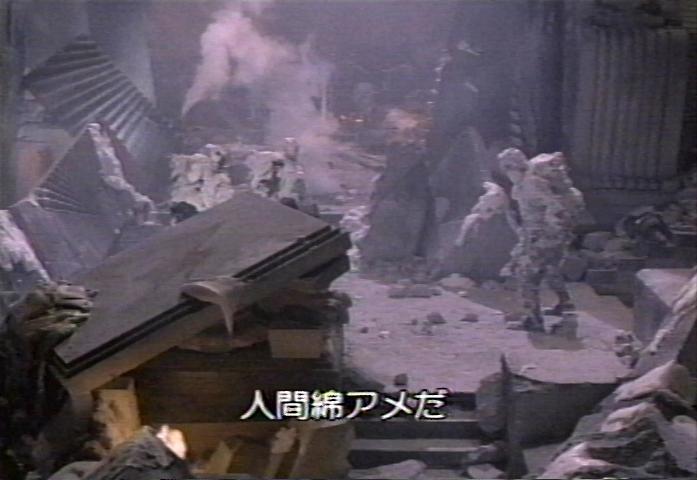
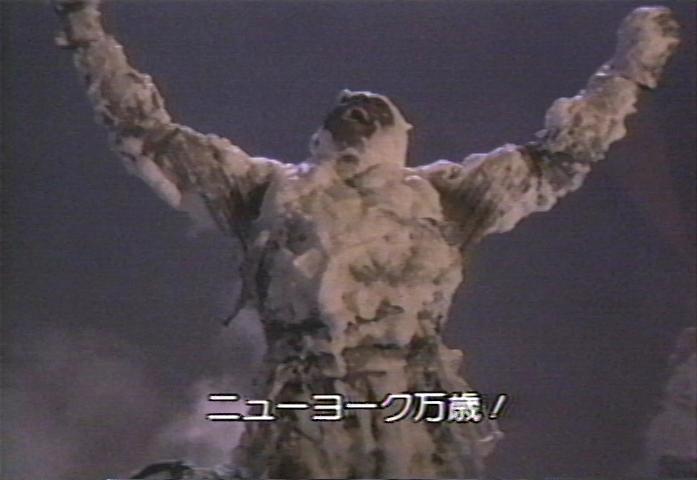
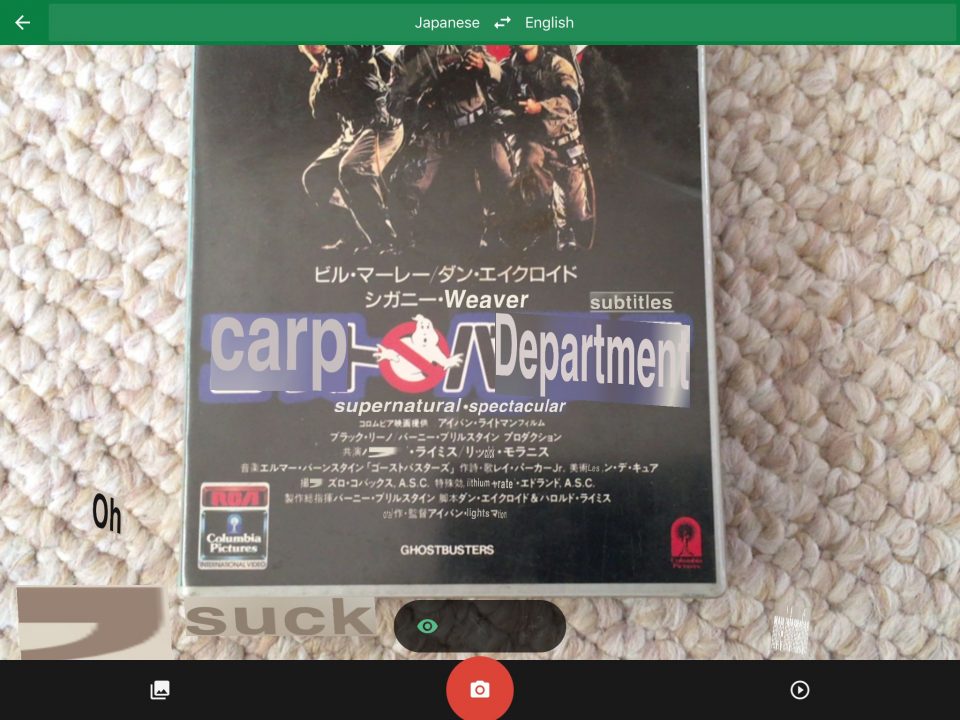
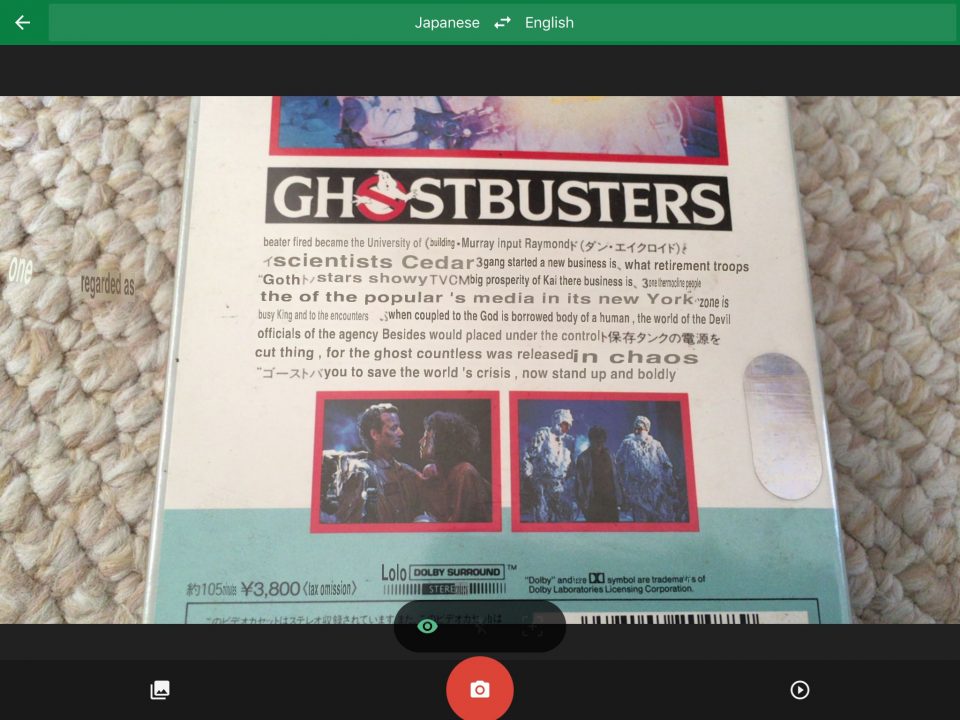
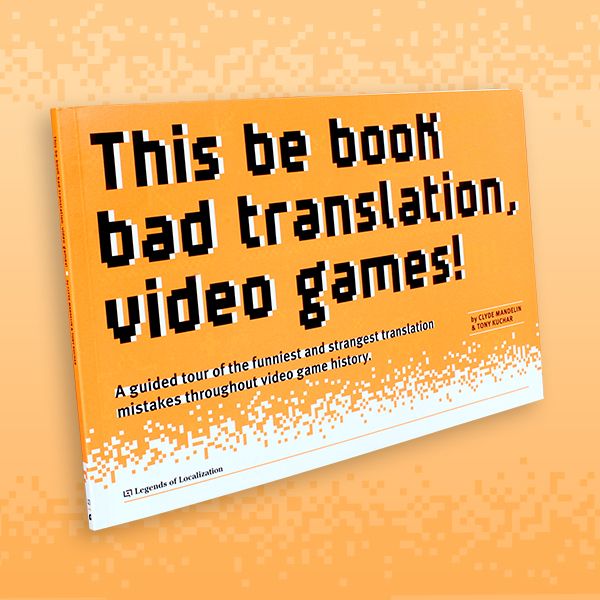
Oh, I really liked the “yes” puns! And the “dekapai” one, too. Stuff like this inspires me. (And the flubs make for good cautionary tales.)
The iesu/Jesus jokes fit well, even if they go slightly beyond the original script. Aykroyd and Ramis probably would have approved.
I don’t think this translator did a very good job. And of course they had to stick a boob joke in there…because Japan loves the melons.
What country doesn’t?
“should a translator, when not compensating for stuff that’s lost in translation, add things not found in the original source? That’s one of the great debates that’s been going on for ages.”
I give a lot of leeway if the original work as a whole is a comedy (and Ghostbusters definitely qualifies). In a comedy getting laughs comes ahead of the story.
Bobobo-bo Bo-bobo comes to mind as a comedy where very little of the humor resembles the original (“Get these Japanese letters of of me”), yet it actually works.
I think you’re reading a little much into the cats and dogs line, Mato. 😛
To overexplain it, the idea behind the joke is probably more along these lines. Cats and dogs are often imagined as natural enemies (there’s basis in this in that their natural ways of communicating and behaviour mesh very poorly, and if not properly socialized with each other, they’ll probably end up in a chase or a fight). Peter is describing the world falling into disorder. So cats and dogs being in peace, which they don’t normally do, also matches with the natural order falling apart, albeit in a much less impressive and silly way than the (super)natural disasters mentioned before.
I can’t speak for how the Japanese line would be read, because I’m not sure if they have that same cultural notion of the rivalry between cats and dogs, but it’s still less impressive and the inter-species aspect still suggests at something unnatural.
If the translator wanted to make it even more familiar to the Japanese audience, maybe they could have changed the reference to dogs and monkeys, who are referred to as having a similar natural rivalry in Japanese idioms as such. For example, the Medabots anime actually makes an extended joke on this rivalry – I think the dub went out of its way to add the explanation since Americans wouldn’t get it – wherein one Medabot character underperforms in battle because their mind (medal) is a monkey, while their combat parts are all dog parts, which have mismatched specialties.
Yeah, I agree, that’s why I said I liked the joke early on – it’s funny thinking that such mortal enemies would be living together. At the time, I also felt like there was maybe more to it that I wasn’t getting, something that smarter people or grownups were getting. Later, after learning the Biblical meanings of “knowing someone” and “living together with someone”, I was like ah, that must be it.
As you say, though, that might be reading too much into the line. At the very least, the Japanese translator interpreted it the Biblical way and has the cats and dogs having sex together. Looking back, I feel I did a poor job explaining this, so I think I’ll revise it a bit for clarity.
“I’m mostly just mentioning it because I like this screenshot”
Hahaha Loved that bit.
Personally, I think the “cats and dogs” line is a classic example of the Murder, Arson, and Jaywalking trope. Peter is trying to explain why the ghosts being released is so bad, and concludes it with something benign and trivial instead of apocalyptic. Dogs and cats are certainly portrayed as mortal enemies in media, but in real life many tend to get along with no problems, which may also be part of the joke.
Anyway, your explanation was necessary to explain the translation’s choice, so you did a fine job explaining it I think.
Specifically, since they had just said “Biblical proportions”, it was probably intentionally similar to Isaiah 11:6.
“The wolf also shall dwell with the lamb, and the leopard shall lie down with the kid; and the calf and the young lion and the fatling together; and a little child shall lead them.”
Maybe, but that passage is using metaphors to describe a peaceful new era where old enemies come together as friends, so it’s kind of the exact opposite of the “wrath of god stuff”. Those animal lying together is supposed to be very good.
Plus, it’s Peter, who throughout the movie has steadfastly refused to take anything seriously. So while Ray and Egon are going full Old Testament prophet, he goes and deflates it with something as mundane as dogs and cats.
Carp Department has always been my favorite movie.
They really need to re-release Carp Department on Blu-Ray.
Didn’t they already do that… in 2009?
Typo: “asks some him questions”.
Ooh, the okama line. I feel like the translator was probably more familiar with “fruitbasket” as a whole as slang for a gay man than a literal basket of fruit, when out of context it’s usually the latter. Still… I wonder how many native English speakers *did* interpret that line as a gay joke?
A lil’ disappointed you didn’t have a dubbed version to look at instead for the reason you mentioned at the start, but I guess with subs, you can show off the exact original line, which is a benefit for those who are literate.
Not Ghostbusters-related, but right before reading this article I walked past our TV, where 2 Fast 2 Furious was on, and saw the subtitles translate “He’s clean. Dirty, but clean.” as “He’s ok. Criminal, but ok.”
I’ll admit I can’t really come up with a better translation at the moment, but man, that really kills a memorable line, and is a pretty good example of how quips and snappy lines very often get lost in translation because they tend to be very hard to translate well.
OK, I’m really curious about how they translated “don’t cross the streams” line. I always saw it as toilet humour, but again could be reading too much into it, lol.
Egon simply says 交差させるな in the ballroom scene, so it looks like the translator didn’t see any bathroom humor in it.
Fun fact, which you may or may not find important: The usage of “toast” as it occurs in the Ghostbusters film – e.g. “you’re toast” – may have originated with the film itself, with the Oxford English Dictionary considering it probable. The original line in the script is “Okay. That’s it! I’m gonna turn this guy into toast.”
Checking’s Mark Davies’ English Corpora, the 1967 Two Weeks in September supposedly has it, but it’s a foreign film and the translation the database is pulling from may be newer. Likewise Just One of the Guys the year after Ghostbusters had it. Aside from this though, there’s a conspicuous absence before Ghostbusters released, so I wouldn’t doubt it *popularized* the phrase if nothing else. Wouldn’t be the weirdest phrase to originate in pop culture though: Bugs Bunny did turn the name of a biblical hunter into an insult.
In the “Scared to Death” section where Winston is explaining to the mayor, the third screenshot is a repeat of Walter responding to Peter’s insult.
Also, when Louis/Vinz is talking about Gozer’s forms, could the giant slug and fire-breathing toad be references to ninja pop culture? I know giant frogs are a recurring reference, though I can only think of Naruto as a reference for slugs.
Both Jiraiya and his toad magic and Tsunade and her slug magic originate from The Tale of the Gallant Jiraiya. It’s not a pop culture thing, it’s a folklore thing.
Maybe it is wrong movie and language. But I finds it really funny.
In Ghostbusters 2 with Swedish subtitles, had this lines translated weirdly to Swedish.
This lines in question:
– You mean that this stuff actually feeds on bad vibes?
– Like a cop in a donut factory.
In Swedish:
– Får det näring av dåliga vibbar?
– Som snoppen på donutfabriken.
So it translates back to english like this:
-Does it get nutriment by bad vibes?
– As the penis in the donut factory.
I cant really get why the translator went with it. It is really hilarious!
Speaking of Swedish subtitles, I remember watching Kick-Ass with Swedish subs, and they consistently translated “coke” as “cola” rather than “kokain”. That’s… not actually Swedish slang, is it? Because I don’t think it is, and if it isn’t, the translator missed the point pretty hard.
Funnily enough, ‘kola’ is indeed slang for kokain (it crops up sometimes in interviews and cheesy thrillers), but a) I’ve got no idea how well-used it is these days and b) that slang is spelled with a k rather than a c. So despite the coincidence, I’d still wager it’s just a simple case of the translator getting it wrong
Cop→police→detective→dick→penis, perhaps?
That part about Walter forgetting the magic word reminds me that there is a similar sort of moment in the first or second chapter of Harry Potter and The Chamber of Secrets, where Harry comments on Dudley forgetting the magic word, which angers the heavily anti-magic Dursleys. I now wonder how this scene was written in Japanese, since again, they don’t have the “magic word” phrase, which is central to the joke.
What’s the joke regarding the fruit basket about? Is he calling the guy in question crazy?
My take on it is that he’s sarcastically saying “Man, he was such a nice guy and I’m gonna miss him so much that I should get him a nice gift and/or get well-gift”.
That’s how I always heard it. I’ve heard of “fruit” as an insult for gay people, but never “fruit basket.” If true, it certainly puts a dark spin on the manga Fruits Basket.
The “dog-pig” translation might be referencing “schweinhund”, a German insult that literally means “pig-dog”.
This looks like the 戸田奈津子 translation. She’s actuallya pretty famous(and in some cases infamous) movie translator.
Regarding “I feel so funky,” it kind of looks to me as if the translator took “funk” in its sense of meaning a strong musty smell, rather than a Venkman-ish way of saying “I feel funny.”
Just a question: in other foreign translations, what they did with the J. Edgar Hoover reference? The Italian dub replaced him with Hitler for example.
Probably, ひっかける is used in this meaning.
⑦ 液体や砂などを浴びせかける。ぶっかける。 「水を-・けられる」 (三省堂 大辞林)
Thank you, you’re exactly right!
Oh man. As someone who apparently has a knack for translating puns and wordplay, I am utterly tickled by the イエス wordplay – that’s remarkably clever!
This was a really fun read! Even if this was posted a while ago, I hope you do some other movie side-by-sides at some point–it’s both interesting to see how the source material gets converted to keep jokes and phrases making sense, and how things need to be pared down for subtitles. It brings similar different limitations to the table than game translations.
About the yakitori line, I was wondering if the translator was trying to keep all the nuances of ‘this chick is toast’–‘this chick is toast->toasted chicken->yakitori’.
I’m genuinely curious, since I’ve never seen the Japanese version, and have only seen the screenshots, did they just do subtitles and no dubs with these movies and it’s the English language, with Japanese subs, or did they do both?
Genuinely curious, because it’s tempting to pick up a copy of both original movies to have for my collection.